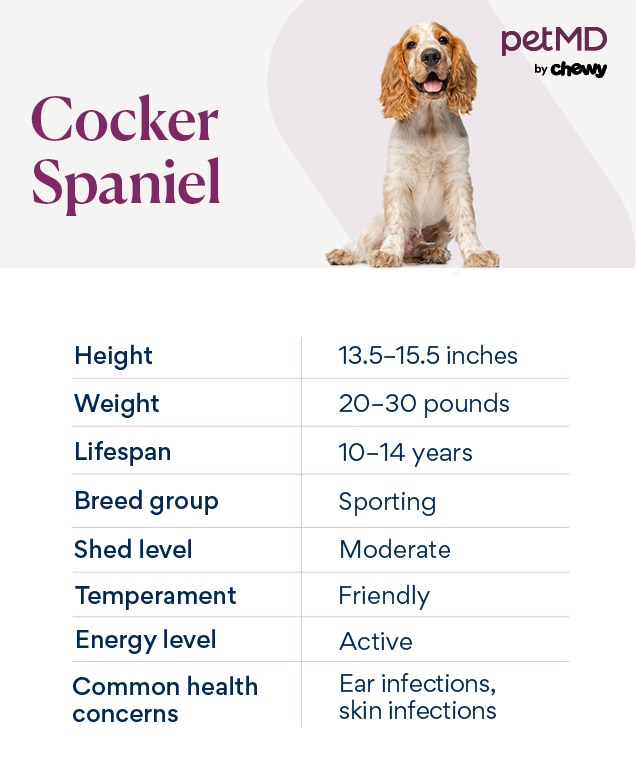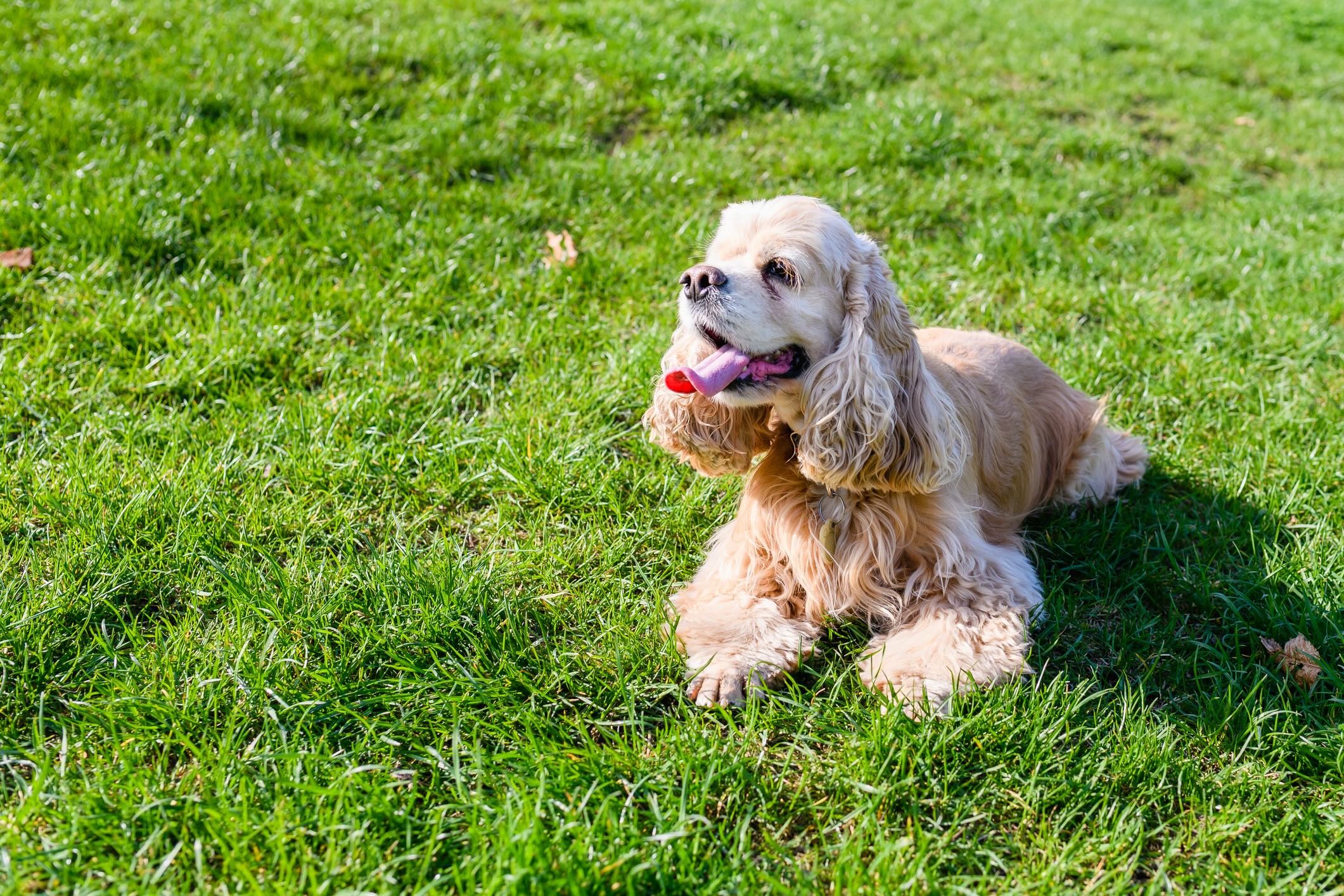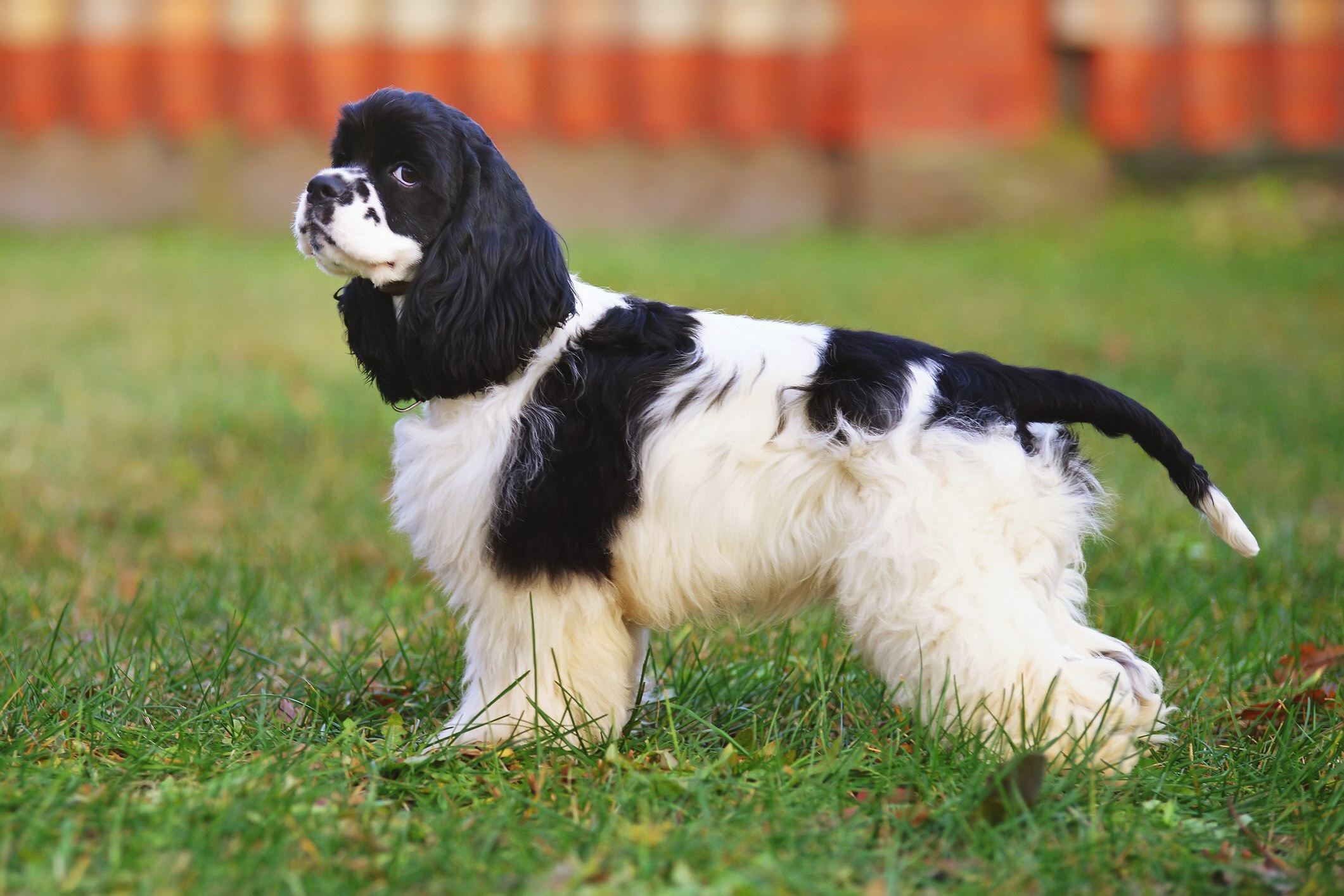Cocker Spaniel
Adobe Stock/otsphoto
The Cocker Spaniel, also called the American Cocker Spaniel, is one of the world’s most-loved dog breeds because of their big, round eyes; long ears; sweet face; and playful personality.
American Cocker Spaniels were bred to be hunting dogs and have the size to keep up in the field, but they’re also small enough to travel well and cuddle on the couch. They make excellent companions for first-time pet parents, adults and children alike.
Caring for a Cocker Spaniel

The average Cocker Spaniel size is 13.5–15.5 inches tall and 20–30 pounds, making them the smallest sporting spaniel in the American Kennel Club (AKC). They have characteristically long, furry ears and come in 15 different standard coat colors, including black, brown, black and white, red, and golden.
There are two types of Cocker Spaniels: American Cocker Spaniels and English Cocker Spaniels. The two dogs look very similar, but there are subtle differences between Cocker Spaniels and English Cocker Spaniels. Namely, American Cocker Spaniels are typically a little taller, have longer ears, and wear a thicker coat than English Cockers.
Cocker Spaniel dogs were originally bred to hunt, but now they are most commonly found as companion pets thanks to their friendly personality. They have a well-balanced and strong body that allows them to be both sturdy and agile.
Cocker Spaniel Health Issues

The typical Cocker Spaniel lifespan is 10–14 years, so they’ll be a longtime companion. They are susceptible to a few health conditions, so purchasing pet insurance might be a good investment when bringing home a Cocker Spaniel puppy.
Ear Infections
A Cocker Spaniel’s famously lush ears can be prone to ear infections. This is because the ears’ floppy shape can trap moisture in the ear canals, making it easy for bacteria and/or yeast to thrive.
Signs of an ear infection include:
-
Redness
-
Odor
-
Itching or scratching at the ears
-
Discharge
-
Shaking of the head
Contact your vet right away if you notice any of these symptoms.
Ear infections in dogs can be prevented with regular ear cleaning. Ask your vet how often you should clean your Cocker Spaniel’s ears, and always clean them after your dog goes for a swim or takes a bath. It’s important to be proactive about managing your Cocker Spaniel’s ear health.
Skin Infections
Pyoderma, or skin infections, can occur when long hair coats are not routinely groomed or secondary to allergies. The long hair becomes tangled and forms tight mats, trapping moisture and bacteria that can cause an infection. Routine brushing and grooming your dog can help prevent this.
Hip Dysplasia
Hip dysplasia is most common in large pups, but medium-sized dogs like the Cocker Spaniel can develop it as well. The condition occurs when the hip joint doesn’t develop properly as a dog grows, leading to looseness and, if left untreated, arthritis.
Hip dysplasia may be managed in Cocker Spaniels with weight management, joint supplements, and pain medication. However, if your dog’s condition is particularly severe, surgery may be needed.
Von Willebrand Disease (vWD)
A common bleeding disorder, von Willebrand disease makes it difficult for affected dogs to form blood clots. Cocker Spaniels are one of the breeds that can develop vWD, and the condition can make injuries and surgeries dangerous for your dog.
Talk to your vet if you notice any abnormal or prolonged bleeding in your dog, such as nosebleeds, blood in the urine or stool, or bleeding from the gums.
What To Feed a Cocker Spaniel
The needs of the individual dog dictate the best diet for a Cocker Spaniel, but it’s always important to select a dog food with high-quality ingredients. Look for a food that meets the nutritional guidelines set by the Association of American Feed Control Officials (AAFCO).
Your Cocker Spaniel’s veterinarian can make dietary recommendations based on your pup’s specific medical history. Royal Canin® makes dog food specifically formulated for Cocker Spaniels’ needs.
Cocker Spaniels that serve exclusively as family pets can easily become overweight. It’s important to maintain proper body conditioning and weight by avoiding overfeeding.
Working Cocker Spaniels are more active but still need proper portions and food to prevent obesity.
How To Feed a Cocker Spaniel
Most American Cocker Spaniels follow a standard feeding schedule like other adult dogs. Typically, giving your pup two meals, one in the morning and one in the evening, is best for this breed. Cocker Spaniel puppies can eat more frequently; three to four meals daily.
Because Cocker Spaniels have long, lush coats, food can often get tangled in their hair as they eat. After meals, clean off any food from their fur to prevent matting.
How Much Should You Feed a Cocker Spaniel?
Always follow the feeding guide provided by your specific food brand to ensure that your dog is receiving the appropriate essential daily nutrients—you can often find this information on the bag.
Talk to your vet for the best guidance on how much to feed your dog. A veterinarian will consider your dog’s current weight, ideal weight, health, and lifestyle when making portion recommendations.
Nutritional Tips for Cocker Spaniels
Most healthy Cocker Spaniels receive all needed nutrients from their AAFCO-compliant dog food.
For a working Cocker Spaniel that participates in sporting activities, it could be helpful to supplement them with glucosamine and chondroitin to help keep their joints healthy. Omega-3 supplements (fish oil) can also aid in protecting joint health and keep their skin and coat lush and soft.
Always talk to your vet before giving your dog a supplement.
Behavior and Training Tips for Cocker Spaniels
Cocker Spaniel Personality and Temperament

While Cocker Spaniels are sporting dogs, they don’t require high levels of exercise to stave off excess energy. They typically enjoy playing with toys, fetching a ball, or walking with their family members a few times a day as forms of exercise.
At home, these sweet-tempered pups love being close to their people and make great family dogs.
Cocker Spaniel Behavior
Cocker Spaniels offer a friendly personality, both with people and with other animals. They can be good apartment dogs thanks to their temperament, size, and manageable energy level.
Cockers love to be close to their people, and they are known to follow their pet parents around the house.
Cocker Spaniel Training
Cocker Spaniels want to please their pet parents, meaning they’re often easily motivated by rewards of food and praise. Always use positive reinforcement training methods, but make sure you don’t overfeed your pup treats. Treats should never be more than 10% of a dog’s daily diet.
Start socialization and training classes early so your Cocker Spaniel puppy learns good manners. This breed also enjoys performance activities, such as agility training.
Fun Activities for Cocker Spaniels
-
Walking
-
Fetching a ball or toy
-
Field work
-
Working as therapy dogs
-
Learning tricks
-
Playing with housemates (human or dog)
Cocker Spaniel Grooming Guide
Although Cocker Spaniel dogs can have coats in more than a dozen colors, the official American Spaniel Club says the breed is broken up into three varieties:
-
Black Cocker Spaniels
-
ASCOB Cocker Spaniels (meaning “every solid color other than black”)
-
Particolor (tricolor, red and white, brown and white, and black and white Cocker Spaniels)
Frequent and regular brushing is required to maintain a Cocker Spaniel’s fairly high-maintenance coat and help prevent matting. Regular brushing will also help manage shedding, which is a year-round affair for this breed thanks to their double coat. Cocker Spaniels also benefit from regular professional grooming.
Skin Care
Skin care for the Cocker Spaniel varies depending on the individual’s needs. However, the breed does not typically have sensitive skin.
Bathe your dog as needed using a dog-specific shampoo. Never use human shampoo on your dog, as this can dry out the skin.
When bathing your dog, it’s important to thoroughly rinse the hair, as soap residue on the skin can cause irritation. Dry the hair completely with a low-heat dryer to prevent moisture from lingering in the hair and skin. Residual moisture can lead to matting and skin infections.
Coat Care
An American Cocker Spaniel’s long coat can be prone to matting, which can cause skin infections if not cared for properly. Frequent brushing (at least once a week) is important to prevent infections as well as excess shedding.
Eye Care
Routine cleaning with a soft, damp cloth or dog-friendly eye wipe will help prevent tear stains from building up around your Cocker’s eyes.
Ear Care
Because Cocker Spaniels are prone to ear infections, routine cleaning with a veterinary-approved ear cleanser is vital in maintaining healthy ear canals. This should also be done any time after an American Cocker Spaniel is in water, such as after a swim or a bath.
Considerations for Pet Parents
Before bringing home a Cocker Spaniel puppy, the breed club recommends asking yourself a few questions about your lifestyle.
Cockers are not a good fit for you if you don’t like any sort of exercise, if you’re not willing to keep up with grooming a few times a week, or if a dog following you around will drive you crazy. These spaniels are best for families that want constant companionship and walking buddies.
Cocker Spaniel FAQs
Is a Cocker Spaniel a good family dog?
Yes, the American Cocker Spaniel is generally a well-tempered and friendly dog, typically a good family pet that does well with people (and other pets) of all ages.
Are Cocker Spaniels hypoallergenic?
Cocker Spaniel dogs are not considered to be hypoallergenic. In fact, there is really no such thing as a hypoallergenic dog.
Do Cocker Spaniels shed?
Yes, Cocker Spaniels shed year-round thanks to their double coat. Regular brushing can help reduce shedding.
How much do Cocker Spaniels cost?
The cost of a Cocker Spaniel puppy varies on bloodlines, breeder, and where you live. The average Cocker Spaniel price can be anywhere from $1,500 to $3,000 or more. You can also find adoptable dogs through Cocker Spaniel rescues.
How long do Cocker Spaniels live?
The average Cocker Spaniel life expectancy is 10–14 years.
What is the main color of American Cocker Spaniels?
American Cocker Spaniels come in many colors, including black, red, and brown. The most popular Cocker Spaniel coat color is buff, which is a light golden-orange color.
What’s the difference between the American Cocker Spaniel and English Cocker Spaniel?
While the two look quite similar, there are subtle differences between American Cocker Spaniels and English Cocker Spaniels, mainly in appearance.
American Cocker Spaniels tend to be slightly larger and stand taller than the English breed. While both have the characteristic droopy ears and long coats, American Cocker Spaniels tend to have longer ears and a thicker coat than their English counterparts.
